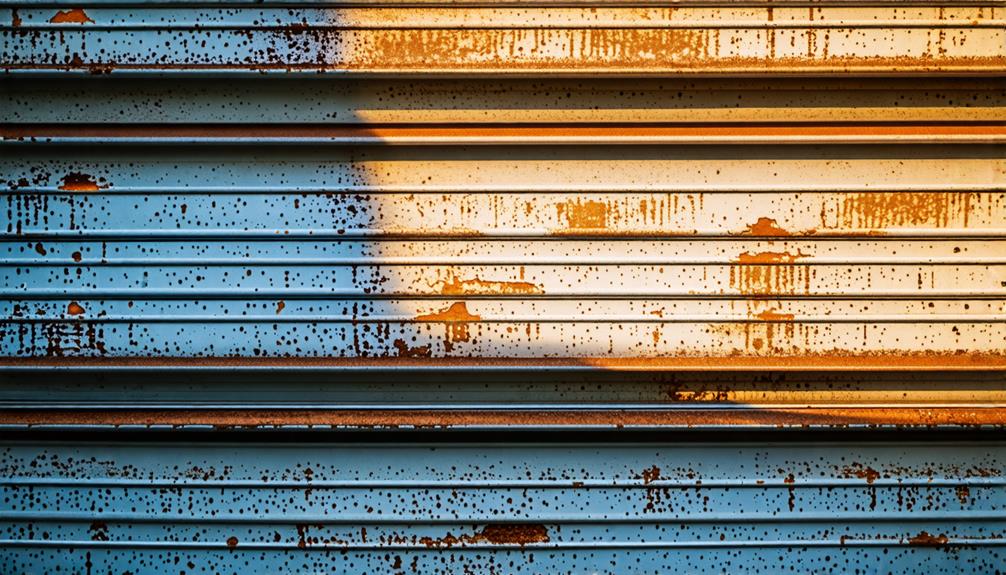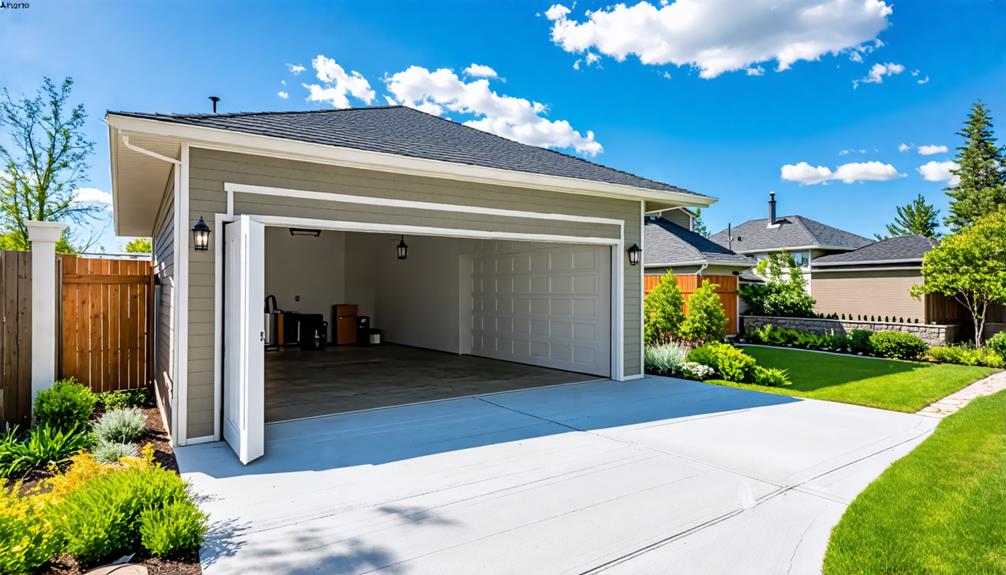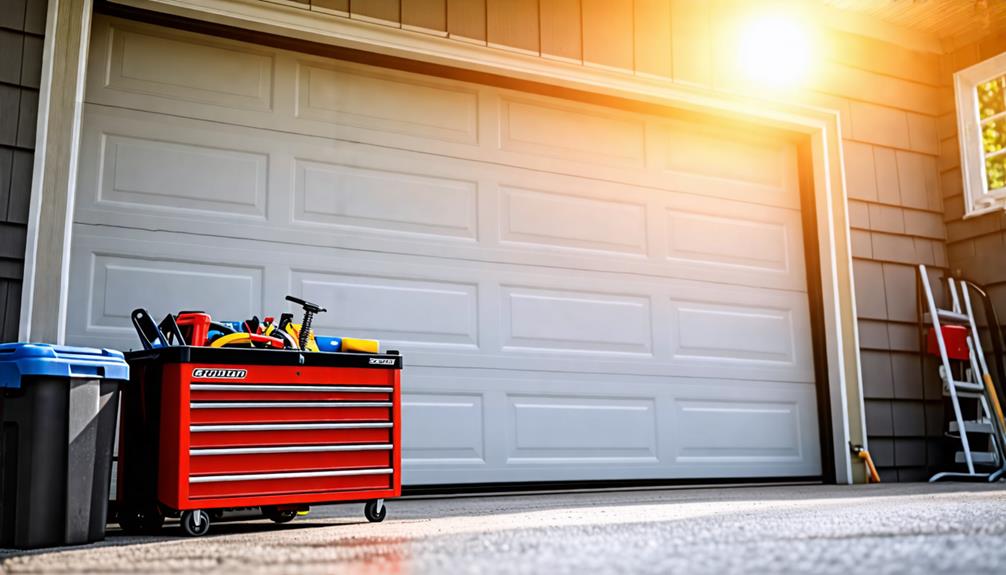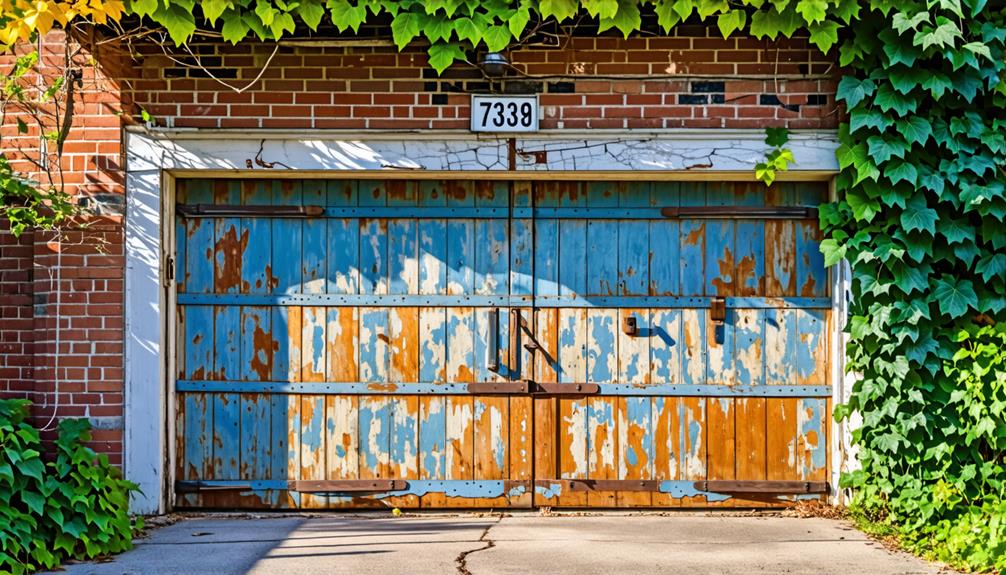
How Long Are Garage Doors Good For?
Garage doors typically last between 15 to 30 years, depending on various factors. The quality of materials, frequency of use, environmental conditions, and maintenance practices all play indispensable roles in determining a door's lifespan. You'll notice signs of aging like unusual noises, visible wear, and slower operation as your door approaches the end of its life. Regular maintenance, including cleaning and lubricating moving parts, can tremendously extend your garage door's longevity. Professional annual inspections are also recommended to catch potential issues early. By addressing minor problems promptly and investing in quality components, you can maximize your garage door's lifespan and guarantee its peak performance. Exploring further will reveal additional insights into preserving your garage door's functionality.
Typical Garage Door Lifespan

Typically, garage doors have a lifespan ranging from 15 to 30 years. This is influenced by various factors such as the quality of the materials used, how often the door is used, and the maintenance practices followed.
Ensuring regular garage door maintenance and repairs can considerably enhance the longevity of your garage door. Other critical factors that can impact the lifespan of your garage door include environmental conditions, like exposure to extreme temperatures, moisture, and corrosive elements.
As your garage door ages, it may start to exhibit signs of wear such as sagging panels, unusual noises during operation, or increasing difficulty in opening and closing, indicating that it might be nearing the end of its useful life.
Average Lifespan in Years
While garage doors can vary in durability, the typical lifespan of a well-maintained garage door ranges from 15 to 30 years. However, several factors can influence this average, including the door's material, usage frequency, and environmental conditions. For instance, wooden doors may require more upkeep and have a shorter lifespan in humid climates, while steel doors tend to last longer in most environments.
To maximize your garage door's longevity, evaluate the following:
- Perform regular maintenance, including lubrication of moving parts and tightening of hardware
- Address minor issues promptly to prevent them from escalating into major problems
- Invest in professional inspections at least once a year to catch potential issues early
It's important to note that different components of your garage door system may have varying lifespans. Springs, for example, typically last between 7 to 12 years, while rollers might need replacement every 5 to 7 years. Have you noticed any signs of wear on your garage door? If you're experiencing frequent breakdowns or difficulty in operation, it might be time to review a replacement, especially if your door is approaching or exceeding the 20-year mark.
Factors Affecting Longevity
Several key factors profoundly influence the longevity of your garage door. The quality of materials used in its construction plays an essential role; high-grade steel or wood can significantly extend its lifespan. How often do you use your garage door? Frequency of operation impacts wear and tear, with doors in constant use requiring more maintenance and potentially shorter lifespans.
Environmental conditions also affect durability; doors exposed to harsh weather, such as extreme temperatures or high humidity, may deteriorate faster.
Maintenance is perhaps the most vital factor. Regular lubrication of moving parts, tightening of hardware, and prompt repairs can dramatically increase your door's longevity. The installation process itself is paramount; a properly installed door will function better and last longer.
Have you considered the impact of your home's structure? Foundation shifts or settling can misalign tracks, causing undue stress on the door system. Finally, the quality of the opener mechanism contributes to overall longevity. A robust, well-maintained opener reduces strain on the door components. By addressing these factors, you can potentially extend your garage door's useful life well beyond average expectations.
Signs of Aging
Understanding the signs of aging in your garage door is key to maintaining its functionality and safety. As your door ages, you'll notice visible wear and tear, such as rust on metal components, cracks in wooden panels, or fading paint. These cosmetic issues, while not immediately threatening, can indicate underlying structural problems that need attention.
Pay close attention to your door's performance. Does it make unusual noises during operation? Is it slower to open or close? These symptoms often point to worn-out springs, rollers, or tracks that require professional inspection and possible replacement.
Additionally, you might observe:
- Increased energy bills due to poor insulation from gaps or warped panels
- Difficulty in manual operation, suggesting issues with the door's balance
- Visible sagging when the door is closed, indicating weakened structural integrity
Benefits

When you invest in a new garage door, you'll reap numerous benefits beyond simply replacing an old one. Not only will you have the ability to customize your garage door according to your preference, but also enjoy improved home security with modern locking mechanisms and sturdy materials, courtesy of professional installation and maintenance services.
Furthermore, you're enhancing your property's curb appeal with stylish designs that complement your home's architecture. Additionally, newer garage doors often feature better insulation, increasing your home's energy efficiency, and many come equipped with smart technology for convenient access control, allowing you to monitor and operate your door remotely.
Improved Home Security
How does a well-maintained garage door contribute to your home's security? A properly functioning garage door acts as a formidable barrier against potential intruders, safeguarding your vehicles, possessions, and often providing direct access to your home. When you invest in regular maintenance and timely repairs, you're reinforcing this pivotal line of defense.
Modern garage doors often come equipped with advanced security features that enhance your home's overall protection. These may include:
- Smart lock systems that allow you to control access remotely
- Tamper-resistant hardware designed to thwart break-in attempts
- Integration with home security systems for extensive monitoring
Enhanced Curb Appeal
Your garage door's curb appeal can make or break your home's first impression. As one of the largest exterior features, it plays an indispensable role in enhancing your property's overall aesthetic. A well-maintained, stylish garage door can tremendously boost your home's visual appeal, potentially increasing its market value.
When considering curb appeal, you'll want to focus on the door's design, color, and material. Modern garage doors come in various styles, from traditional raised panels to contemporary flush designs, allowing you to complement your home's architectural features. Have you thought about how a carriage-style door might enhance a colonial home's charm? Or how a sleek, aluminum door could elevate a modern facade?
Color coordination is equally important. Choose a hue that either complements or contrasts with your home's exterior paint, depending on the desired effect. Additionally, consider the material's impact on aesthetics and durability. Steel doors offer strength and low maintenance, while wood doors provide a classic, high-end look. By carefully selecting these elements, you'll create a garage door that not only functions well but also serves as a stunning focal point for your home's exterior.
Increased Energy Efficiency
With modern advancements, garage doors now offer substantial energy efficiency benefits. You'll find that newer models are designed to provide better insulation, reducing heat transfer between your garage and the outdoors. This improved thermal barrier can help maintain a more consistent temperature in your garage and adjacent living spaces, potentially lowering your energy bills.
When considering the energy efficiency of garage doors, you should focus on these key factors:
- R-value: This measures the door's insulation effectiveness; higher values indicate better insulation.
- Weatherstripping: Quality seals around the door's edges prevent air leakage.
- Window options: Double-paned or insulated glass can further enhance energy efficiency.
Have you noticed drafts or temperature fluctuations in your garage? It might be time to upgrade your door. Modern garage doors often incorporate polyurethane foam insulation, which offers superior thermal resistance compared to older models. Additionally, some manufacturers now use composite materials that provide excellent insulation without adding excessive weight to the door. By investing in an energy-efficient garage door, you're not only improving your home's comfort but also potentially increasing its resale value. Remember, a well-insulated garage door can contribute considerably to your home's overall energy performance.
Convenient Access Control
Along with improved energy efficiency, modern garage doors offer convenient access control features that enhance security and ease of use. You'll find that many contemporary garage door systems come equipped with smart technology, allowing you to operate and monitor your door remotely via smartphone apps. This functionality enables you to check if you've accidentally left the door open or grant temporary access to delivery personnel or service providers.
Advanced keypad entry systems have also become increasingly common, offering you the ability to set multiple user codes for different family members or trusted individuals. Some models even incorporate biometric scanners for fingerprint recognition, providing an extra layer of security. Have you considered the benefits of integrating your garage door with your home automation system?
Many newer garage door openers can be linked to voice-activated assistants like Amazon Alexa or Google Home, allowing for hands-free operation. Additionally, some systems offer geofencing capabilities, automatically opening the door as you approach your property. These convenient access control features not only simplify your daily routine but also contribute to the overall longevity and value of your garage door system.
Maintenance Tips for Longevity

To guarantee your garage door's longevity, you'll need to implement a few key maintenance practices. Regular cleaning and lubrication of moving parts, such as hinges, rollers, and springs, can dramatically extend your door's lifespan. Don't ignore minor issues; addressing them promptly can prevent more serious and costly problems down the line.
| Maintenance Task | Frequency | Importance |
|---|---|---|
| Cleaning | Monthly | High |
| Lubrication | Quarterly | Critical |
| Inspection | Annually | Essential |
Regular Cleaning and Lubrication
Regular maintenance is the key to extending your garage door's lifespan. Cleaning and lubricating your garage door components should be an essential part of your home maintenance routine. By keeping your door clean and well-lubricated, you'll reduce wear and tear, prevent rust, and guarantee smooth operation for years to come.
To maintain your garage door effectively:
- Clean the tracks, rollers, and hinges with a mild detergent solution and a soft brush, removing dirt, debris, and old lubricant buildup.
- Inspect weather stripping and replace if damaged to prevent moisture intrusion and improve energy efficiency.
- Apply a silicone-based lubricant to moving parts, including rollers, hinges, and springs, but avoid using grease or oil-based products that can attract dirt.
Ideally, you'll want to clean and lubricate your garage door every three to six months, depending on usage and environmental factors. For coastal areas or regions with harsh weather conditions, more frequent maintenance may be necessary. Remember, a well-maintained garage door not only lasts longer but also operates more quietly and efficiently, reducing the risk of unexpected breakdowns and costly repairs.
Addressing Minor Issues Promptly
With garage doors, small issues can quickly escalate into major problems if left unchecked. To guarantee your garage door's longevity, you'll need to address minor issues promptly.
When you notice unusual noises, such as grinding or squeaking, investigate the source immediately. These sounds often indicate worn-out rollers, misaligned tracks, or loose hardware that can be easily fixed before causing significant damage.
Pay attention to how your door operates. Is it moving slower than usual? Does it struggle to open or close completely? These signs might point to problems with the springs, cables, or opener system. Don't ignore visible damage, either. Small dents or cracks in panels can compromise the door's structural integrity over time.
How's the weather stripping holding up? Damaged or worn seals can lead to energy loss and allow pests to enter. When you spot these issues, call a professional garage door technician for an assessment. They can diagnose the problem and perform necessary repairs before it worsens.
Professional Annual Inspections
While addressing minor issues promptly is important, professional annual inspections take your garage door maintenance to the next level. These thorough examinations, conducted by experienced technicians, can identify potential problems before they escalate into costly repairs.
During an inspection, the technician will assess all components of your garage door system, including springs, cables, rollers, and the opener mechanism. They'll also check for proper balance, lubrication, and overall safety features.
Annual inspections offer several key benefits:
- Early detection of wear and tear, allowing for timely replacements
- Optimization of door performance, reducing energy costs and noise
- Verification of safety features, ensuring your family's protection
You might wonder, "Can't I just inspect the door myself?" While regular visual checks are valuable, a professional's trained eye can spot subtle issues you may miss. For instance, they can detect minute cracks in torsion springs or slight misalignments in the track system. By investing in annual inspections, you're not only extending your garage door's lifespan but also safeguarding your home and family from potential accidents. Don't underestimate the importance of these professional assessments in maintaining your garage door's longevity and reliability.
Frequently Asked Questions
Can Garage Door Materials Affect Energy Efficiency?
Yes, garage door materials can greatly affect energy efficiency. You'll find that insulated doors made of steel, aluminum, or wood composites offer better thermal protection. They'll help keep your garage temperature regulated, potentially reducing your energy costs.
Are Smart Garage Door Openers Worth the Investment?
You'll find smart garage door openers are worth the investment. They offer convenience, security, and peace of mind. You can control and monitor your garage from anywhere, set schedules, and receive alerts. They're a valuable upgrade for most homeowners.
How Do Extreme Weather Conditions Impact Garage Door Longevity?
Extreme weather can greatly reduce your garage door's lifespan. You'll face issues like warping, rusting, and seal damage. Heat, cold, humidity, and storms all take their toll. Regular maintenance and weather-resistant materials can help combat these effects.
What Are Signs That a Garage Door Needs Replacement?
You'll know it's time to replace your garage door when you notice persistent squeaking, visible damage, poor insulation, outdated style, or frequent breakdowns. If it's hard to open or close, that's another clear sign for replacement.
Are There Eco-Friendly Options for Garage Door Materials?
You'll find several eco-friendly garage door options available. Consider materials like recycled steel, sustainable wood, or insulated aluminum. These choices can improve energy efficiency, reduce your carbon footprint, and still provide durability for your home's exterior.





